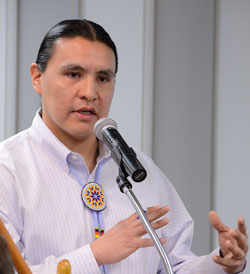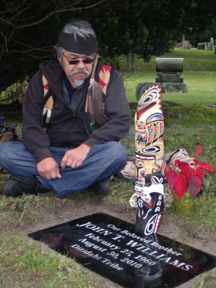
The Lakota People’s Law Project strongly disagrees with Police Chief Karl Jegeris’s decision to deny the permit for Lakota people to participate in an Anti-Police Brutality March and Rally in Rapid City. The march, which is being organized by LPLP Attorney Chase Iron Eyes, Cody Hall and James Swan was slated for Friday at the Rushmore Plaza Civic Center, the same site where the Lakota Nation Invitational is being held.
The LNI provides a unique opportunity for Lakota Indians to educate the public at large about the police brutality that is visited upon Indians in South Dakota. The brutalization of state power that is on the rise across America and has an undue impact on this country’s minority population has also come home to roost in Indian country.
Thousands pour into Rapid City, S.D. every year for the LNI basketball tournament, one of the signature events for South Dakota’s second largest city. The police chief’s refusal also underscores a certain irony in that South Dakota is quick to profit of the Indian community through events like the LNI, but is slow to respond to their calls for justice.
Police Chief Jegeris sent a letter to Hall, Swan, and Iron Eyes, stating that Hall’s permit request had been denied for “public safety reasons,” yet another unsubtle irony given that Jegeris will effectively disallow a protest that calls into question the tactics of his own department.
Police brutality against Native Americans is a serious issue that must be addressed. Earlier, on the Last Real Indians website, Chase Iron Eyes wrote, “I have personal friends who have family that have been killed by the Rapid City Police Department over the years. To my knowledge, every killing of Indians by the Rapid City cops has been “justified” after investigations by the Rapid City Police Dept.”
Such cases of justified killings include the death of Christopher J. Capps, a member of the Lakota tribe who, on May 2, 2010, was shot five times by a Deputy David Olson just outside of Rapid City. While it was claimed that Capps had pulled a knife on Olson, no weapon was found on Capp’s body.
“Rapid City is not a safe place for us,” Iron Eyes writes, “but it has been our home for 10s of thousands of years, and we will stay. There have been several marches on Rapid City amassing as much as 700 people who still feel the same way.”
As of press time, LPLP Chief Counsel Daniel Sheehan has put Iron Eyes in contact with renowned Civil Rights Attorney Patrick Duffey, who is based in South Dakota. Together they will review the possibility of appealing Jegeris’ decision on the basis of the constitutional right to peacefully assemble.
Regardless of whether Iron Eyes prevails in his quest to reverse the Rapid City Police Department’s heavy-handed decision, Lakota People’s Law Project will continue to illuminate issues relevant to Indian justice. The brutalization of Indians in South Dakota, whether through the seizure of their children or through police violence, must stop and it will stop.
Please join us by signing our petition at lakotalaw.org/action.



